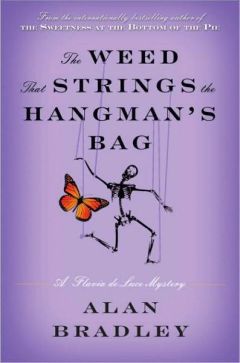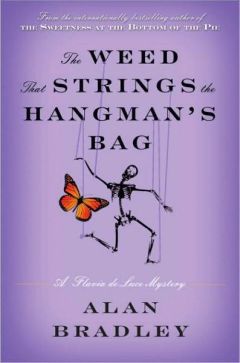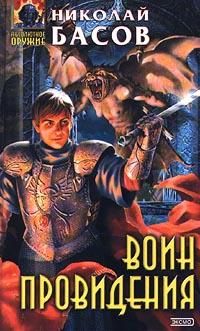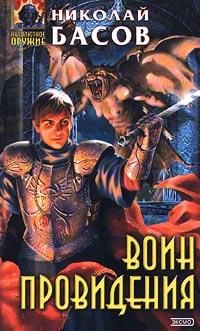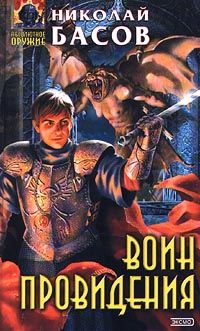Alan Bradley - A Red Herring Without Mustard: A Flavia de Luce Novel
“ ’E can see them, like, but they can’t see ’im.”
Although I was amused at the mad scientist’s idea of injecting a powerful bleach to render himself invisible, what truly shocked me was the way he treated his laboratory equipment.
“It’s just a fill-um, dear,” Mrs. Mullet said, as I gripped her arm during the smashing of the glassware.
But all in all, I thought, looking back on it, the entertainment had not been a success. Invisibility was nothing new to me. It was an art I had been forced to learn from the day I took my first step.
Visible and invisible: the trick of being present and absent at the same time.
“Yaroo!” I shouted to no one in particular as I splashed past St. Tancred’s and into the high street.
At the far end of the village, I turned south. Through the rain I could just make out in the distance the Jack o’Lantern, a skull-shaped formation of rock that overhung my destination, Rook’s End.
I was now running parallel to and a half-mile due east of the Gully, and before many minutes had passed, I was gliding along the edge of one of the great lawns that stretched off in three directions.
I had been at Rook’s End once before to visit Father’s old schoolmaster, Dr. Kissing. On that occasion I had found him in the decaying solarium of the nursing home, and was not looking forward to setting foot in that particular mausoleum again today.
But much to my surprise, as I leapt off Gladys at the front door, there was the old gentleman himself sitting in a wheelchair beneath a large, gaily colored umbrella that had been set up on the lawn.
He waved as I plodded towards him through the wet grass.
“Ha! Flavia!” he said. “ ‘It can be no ill day which brings a young visitor to my gate.’ Horace, of course—or was it Catullus?”
I grinned as if I knew but had forgotten.
“Hello, Dr. Kissing,” I said, handing over the packet of Players I had filched from Feely’s lingerie drawer. Feely had bought the things to impress Dieter. But Dieter had joked her out of it. “No, thank you,” he said when she offered him the packet. “They ruin the chest,” and she had put the cigarettes away unopened. Feely was uncommonly proud of her chest.
“Ah,” Dr. Kissing said, producing a box of matches as if from nowhere and striking one expertly as he was still opening the packet of cigarettes. “How very kind of you to think of my one great weakness.”
He inhaled deeply, holding the smoke in his lungs for what seemed like an eternity. Then, letting it escape as he spoke, he gazed off into the distance, as if addressing someone else.
“Thus he ruins his Health, and his Substance destroys,
By vainly pursuing his fanciful Joys,
Till perhaps in the Frolick he meets with his Bane
And runs on the weapon by which he is slain.”
And runs on the weapon by which he was slain?
My blood chilled as he spoke the last line. Was he referring to his own smoking of cigarettes—or to the bizarre death of Brookie Harewood?
A conversation with Dr. Kissing was, I knew, a game of chess. There would be no shortcuts.
“The Hobblers,” I said, making the opening move.
“Ah, yes.” He smiled. “The Hobblers. I knew you would ask me about the Hobblers. One should have been disappointed if you hadn’t.”
Could Mr. or Mrs. Pettibone have told him of my interest? Somehow, it seemed unlikely.
“Surely you don’t suspect that I am one of them?”
“No,” I said, struggling to keep up with him. “But I knew that your niece—”
Until that very moment I had nearly forgotten that Dr. Kissing was Miss Mountjoy’s uncle.
“My niece? You thought that Tilda was keeping me briefed on your …? Good lord, no! She tells me nothing—nor anyone else. Not even God himself knows what Tilda’s left hand is doing nowadays.”
He saw my puzzlement.
“One needs look no farther than one’s own hearth,” he said.
“Mrs. Mullet?”
Dr. Kissing coughed a wheezy cough—which reminded me uncomfortably of Fenella—and consoled himself by lighting another cigarette.
“It is common knowledge that you are situated, as it were, in close proximity to the estimable Mrs. Mullet. The rest is mere conjecture.
“One has not, of course,” he went on, “communicated personally with the good woman,” he said. “But I believe she is known far and wide for, ah—”
“Dishing the dirt,” I volunteered.
He made a little bow from his waist. “Your descriptive powers leave me in the dust,” he said.
I could easily grow to love this man.
“I know about Nicodemus Flitch,” I told him, “and how he brought his faith to Bishop’s Lacey. I know that there are still a few practicing Hobblers in the neighborhood, and that they still gather occasionally at the Palings.”
“To conduct baptisms.”
“Yes,” I said. “For baptisms.”
“A much more common practice in years gone by,” he said. “There are nowadays few Hobblers left of childbearing age.”
I tried to think of who they might be. Certainly not Tilda Mountjoy or Mrs. Pettibone.
“I believe poor Mrs. Bull was the last,” he said, and I noticed he was watching me out of the corner of his eye.
“Mrs. Bull?”
Was Mrs. Bull a Hobbler?
“Mrs. Bull, who lives in the Gully?” I asked. “The one whose baby was taken by Gypsies?”
I couldn’t help myself. Even though I didn’t believe it, the fearful words slipped out before I could think.
Dr. Kissing nodded. “So it is said.”
“But you don’t believe it.”
I was in fine form now, catching every shade of the old man’s meaning.
“I must confess that I don’t,” he said. “And I expect that you would like me to tell you why.”
I could only manage a stupid grin.
Although the rain was still beating down upon the umbrella with a monotonous drumming, there was a surprising stillness and a warmth beneath its protective cover. Across the lawn, the dreadful house that was Rook’s End crouched like a giant stone toad. In one of its tall windows—in what had once perhaps been the ballroom—two old ladies, in outlandish and outdated costumes, were dancing a stately minuet. I had seen this pair on my last visit to Dr. Kissing, executing their timeless steps beneath the trees, and now they had obviously spotted me.
As I watched, the shorter of the two paused long enough to wave a gloved hand and the other, seeing her partner’s greeting, came almost to the glass and made a deep and elaborate curtsy.
By the time I brought my attention back to Dr. Kissing, he was lighting another cigarette.
“Until last year,” he said, watching the smoke vanish into the rain, “I was still able to make my way to the top of the Jack o’Lantern. For a young man in tip-top physical condition, it is no more than a pleasant stroll, but for a fossil in a wheelchair, it is torture.
“But then, to an old man, even torture can be a welcome relief to boredom, so I often made the ascent out of nothing more than spite.
“From the summit, one can survey the terrain as if from the basket of a hot-air balloon. To the northwest, in the distance, is Greyminster School, scene of my greatest triumphs and my greatest failure. To the west, one has a clear view of the Palings, and behind it, Buckshaw, your ancestral home.
“It was at the Palings, incidentally, that I once asked the lovely Letitia Humphrey for her hand in holy matrimony—and it was at the Palings that Letitia had the jolly good sense to say no.”
“I’ll bet she lived to regret it,” I said gallantly.
“She lived—but without remorse. Letitia went on to marry a man who made a fortune adulterating wheat flour with bone dust. I am given to understand that they made each other very happy.”
A cloud of tobacco smoke made his sigh suddenly visible in the damp air.
“Did you regret it?” I asked. It was not a polite question, but I wanted to know.
“Although I scale the Jack o’Lantern no more,” he said, “it is not entirely because of my infirmities, but rather because of the increasingly great sadness that is visible from the summit—a sadness which is not nearly so noticeable from the lower altitudes.”
“The Palings?”
“There was a time when I loved to gaze down upon that ancient crook in the river as if from the summit of my years. In fact, I was doing so on that day in April, two and a half years ago, when the Bull baby disappeared.”
My mouth must have fallen open.
“From my vantage point, I saw the Gypsy leave her encampment—and later, saw Mrs. Bull pushing the baby’s perambulator along the Gully.”
“Hold on,” I said. “Surely it was the other way round?”
“It was as I have described. The Gypsy woman hitched her horse and drove her caravan north along the Gully. Sometime later, the Bull woman appeared, wheeling her baby south towards the Palings.”
“Perhaps the pram was empty,” I ventured.
“An excellent point,” Dr. Kissing said, “except for the fact that I saw her lift out the infant whilst she retrieved its lost bottle from the blankets.”
“But then Fenella couldn’t have kidnapped the baby.”
“Very good, Flavia. As you may have perceived, I’ve long ago come to that same conclusion.”
“But—”
“Why did I not inform the police?”
I nodded dumbly.
“I have asked myself that, again and again. And each time I have answered that it was, in part, because the police never asked me. But that will hardly do, will it? There is also the undeniable fact that when one reaches a certain age, one hesitates to take on a new cargo of trouble. It is as if, having experienced a certain amount of grief in a lifetime, one is given pass-slip to hand in to the Great Headmaster in the Sky. Do you understand?”
“I think I do,” I said.
“That is why I have kept it to myself,” he said. “But oddly enough, it is also the reason that I am now telling you.”
The silence between us was broken only by the sound of the falling rain.
Then suddenly, from across the lawn, there came a shout: “Dr. Kissing! Whatever are you thinking?”
It was the White Phantom, the same nurse I had seen on my previous visit to Rook’s End, now looking ludicrous in her white uniform and huge black galoshes as she came galumphing across the grass towards us through the falling rain.
“Whatever are you thinking?” she asked again as she stepped beneath the umbrella. I’ve observed that domineering people like the White Phantom often say everything twice, as though they’re on a quota system.
“I am thinking, Nurse Hammond,” Dr. Kissing said, “of the sad decline in English manners since the late war.”
His words were met with a silent sniff as she seized the handles of his wheelchair and shoved off rapidly with it across the lawn.
As she paused to open the conservatory door, Dr. Kissing’s words came floating back to my ears—
“Tally-ho, Flavia!”
It was a call to the hunt.
I waved like mad to show him that I had understood, but it was too late. He had already been wheeled indoors and out of sight.
TWENTY-TWO
I THINK THERE MUST be a kind of courage that comes from not being able to make up your mind.
Whether it was this or whether it was Gladys’s willfulness I can’t be sure, but there we were, suddenly swerving off the main road and into the Gully.
I had been going here and there about the village, avoiding the unpleasant Mrs. Bull in much the same way as a housefly avoids the folded newspaper. But the Gully was a shortcut home to Buckshaw, and there was no time like the present.
Although Gladys’s black paint was now spattered with mud, she seemed as frisky as if she had just been curried with a bristled brush and wiped down to perfection. Her nickel handlebars, at least, glittered in the sun.
“You’re enjoying this, aren’t you, old girl?” I said, and she gave a little squeak of delight.
Would Mrs. Bull be standing guard at her gate? Would I have to pretend again to be Margaret Vole, niece of that fictional—but beloved—old character actress, Gilda Dickinson?
I needn’t have worried. Mrs. Bull was nowhere in sight, although the hovering smoke from the rubbish heaps made it difficult to see much of the property.
Her redheaded boy—the one who had been perched in the branches when I rode through the Gully with Fenella—was now sitting in the ditch at the edge of the road, digging his way to China with a piece of cutlery.
I brought Gladys to a slithering stop and put both feet on the ground.
“Hello,” I said, rather stupidly. “What’s your name?”
It was not the most brilliant opening, but I wasn’t accustomed to talking to children, and hadn’t the faintest idea how to begin. It didn’t matter anyway, because the little wretch ignored me and went on with his excavating.
It was difficult to judge his age, which might have been anywhere between four and seven. His large head wobbled uneasily atop a spindly body, giving the impression that one was looking at rather a large baby or a small adult.
“Timofey,” he said in a froggy croak, just as I was about to shove off.
“Timothy?”
There was another awkward pause, during which I shifted uneasily from foot to foot.
“Timofey.”
“Is your mother at home, Timofey?” I asked.
“Dunno—yes—no,” he said, giving me a wary sideways glance, and he returned to his digging, stabbing fiercely at the soil with his bit of tableware.
“Digging for treasure, are you?” I asked, going all chummy. I leaned Gladys against a bank and climbed down into the ditch. “Here, let me help.”
I casually worked my hand into my off-side pocket and closed my fingers around a stick of horehound.
With a quick darting motion, I reached down into the hole he was digging, and pretended to extract the sweet.
“Oh, Timofey!” I cried, clapping my hands. “Look what you’ve found! Good boy! Timofey’s found a sweet!” Although it jarred, I couldn’t bring myself to call him by any name other than the one he called himself.
As I held out the horehound, he snatched it away from me with a lightning-fast movement and shoved it into his mouth.
“Preasure!” he said, gnawing nastily.
“Yes, treasure,” I cooed. “Timofey’s found buried treasure.”
With the horehound stick jutting out of the corner of his mouth like a sickroom thermometer, Timofey put down his digging implement and attacked the hole with his bare hands.
My heart gave a leap as my mind registered what now lay exposed in the dirt: the silver … the prongs … the figure of the lobster punched from the handle … the de Luce monogram …
The child was digging with one of the de Luce lobster picks! But how could that be? Dogger had already shipped the silver to Sotheby’s for auction and the only piece that had been overlooked, perhaps, was the one that had been used to put paid to Brookie Harewood. And that, unless I was sadly mistaken, had, until quite recently, been shoved up Brookie Harewood’s nostril and into his brain. How could it possibly have made its way from there into the hands of an urchin grubbing in the Gully? Or could this be a copy?
